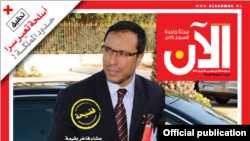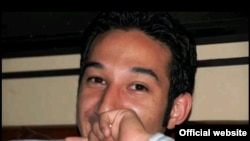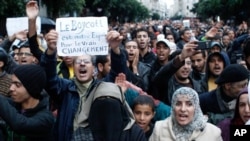What happens when a trade minister, entrusted with public funds, spends them on an extravagant hotel room service bill? If you guessed, "Journalist who publicizes the bill ends up facing prison time," you'd be right. At least in Morocco.
That's the situation Moroccan investigative journalist Youssef Jajili is in. The founder and editor of Alaan Magazine printed a copy of Abdelkader Amara’s hotel bill from an official visit he made to Burkina Faso. The bill shows the minister spent nearly US$1,000 in taxpayer funds on a room service meal that, according to Jajili's source, included two bottles of champagne for the Muslim official.
Amara says Jajili made up the story and is suing him for criminal defamation in a case media rights groups say exemplifies the government’s failure to make promised political reforms and its campaign to silence independent journalists.
Reconciliation?
A judge in a Casablanca suburb on Monday postponed the trial for a month, giving the two parties time for “reconciliation.”
Jajili says if reconciliation requires an apology on his part, it’s not going to happen - even if he has to go to prison.
“Why [would] I write an excuse? I didn’t do any fault. I didn’t do any bad thing. I just did my job as a journalist,” he said in a telephone interview from Casablanca.
“I think it was a good story for Moroccan people to know the reality of this minister,” he said of the June article. “In Morocco, drink [alcohol] is illegal … At the same time, he [buys] two bottles of champagne with the money of the Moroccan people.”
Twenty-nine year-old Jajili grew up poor and established his weekly magazine last April to expose what he considers government hypocrisy that is keeping Moroccans impoverished.
A rare breed
He is one of few investigative reporters in a country where advertising boycotts, criminal defamation suits, prison terms, fines and even physical assault are putting independent journalists out of business.
“There are fewer and fewer, and even those who were really strong, independent media are not as strong as before. They’re a bit tired of being all the time harassed and facing difficulties,” said Soazig Dollet, in charge of the Maghreb region for Reporters Without Borders.
The Paris-based group ranked Morocco 136 out of 179 countries on its 2013 Press Freedom Index that came out Wednesday.
Dollet said in the weeks leading up to the index’s release, Moroccan authorities sent her “tons and tons of documents” about how much press freedom has improved.
“I know the Moroccan authorities are really concerned about the image,” she said, adding that Prime Minister Abdelilah Benkirane was careful to avoid a question about the defamation case during the World Economic Forum in Davos, Switzerland last week.
“The prime minister said he was not aware, which is not possible,” she said.
Dodging a request from the head of Human Rights Watch to stop criminalizing defamation, Benkirane instead pointed to the progress made.
“Only one year after the elections, which were held on the 29 of November [2011], if there was only one trial ... for someone who engaged in defamation, then I think that that shows that there have been no violations of the law in Morocco when it comes to the media compared to how things were a few years ago in Morocco and other countries,” Benkirane said.
Scroll to 44:20 to watch the Moroccan leader discuss defamation.
A muted Arab Spring
Morocco has not suffered the deadly unrest that overturned governments in Tunisia, Libya and Egypt, but it has experienced its own kind of Arab Spring in the form of the February 20 Youth Movement.
Frustrated Moroccans took to the streets two years ago, demanding democracy, a constitutional monarchy and an end to corruption and press censorship.
Anxious to avoid the fate of his neighbors, Moroccan King Mohammed VI promised sweeping constitutional reforms that would curb his powers and called an early parliamentary election that ushered in the country’s first Islamic government lead by the Justice and Development Party.
It was a smart move, according to Moshen Shawarby, a corruption and governance consultant who worked with both Moroccan authorities and the United Nations from 2009 to 2012.
“It’s a good PR party,” he said of the JDP’s public relations savvy. “They approached the people by making a lot of promises. They said they would offer social welfare, insurance policies, help for the poor. The people were happy at first. There was a lot of positive media.”
But the honeymoon may be ending.
New government, old problems
“Now the people are experiencing a problem of rising expectations. It’s really a matter of time before it’s realized they haven’t cashed in on any of the promises,” Shawarby said.
He said the new government has inherited the problems of the old, specifically public funds being used for private gain.
So when journalists like Youssef Jajili start asking questions, it makes the new government nervous that other journalists will start digging into even weightier issues, according to Shawarby.
He said it would be in the government's interest to drop the charges because if Jajili is "punished or jailed, it'll be serious negative publicity for the Islamic party."
Signing on to democracy
Jajili’s international supporters are hoping the Moroccan king will make the same calculation. Amber Lyon, a U.S.-based investigative journalist who was banned from Bahrain for reporting on the protests there, has started a petition to “Save Youssef.”
“The king has made reforms and he has been promoting Morocco as a democracy internationally,” she said. “And the greatest barometer for the health of democracy is freedom of press.”
Although Jajili faces up to a year in prison if convicted, he is still working and encouraging other reporters to stay brave. It’s a bit hard, he says, because government officials are boycotting the magazine’s requests for interviews.
Trade Minister Amara has not responded to our own requests for an interview.
He has accused Jajili in the Moroccan press of fabricating the story. On his Facebook page, Amara says he plans to prosecute “any person directly or indirectly involved in this action, which attacks my honor and dignity, and the honor of my position, my family and my party.”
Jajili returns to court on February 25. While he waits, the journalist says he has a bad feeling.
“It’s a bad feeling because I don’t know the end of this story."






